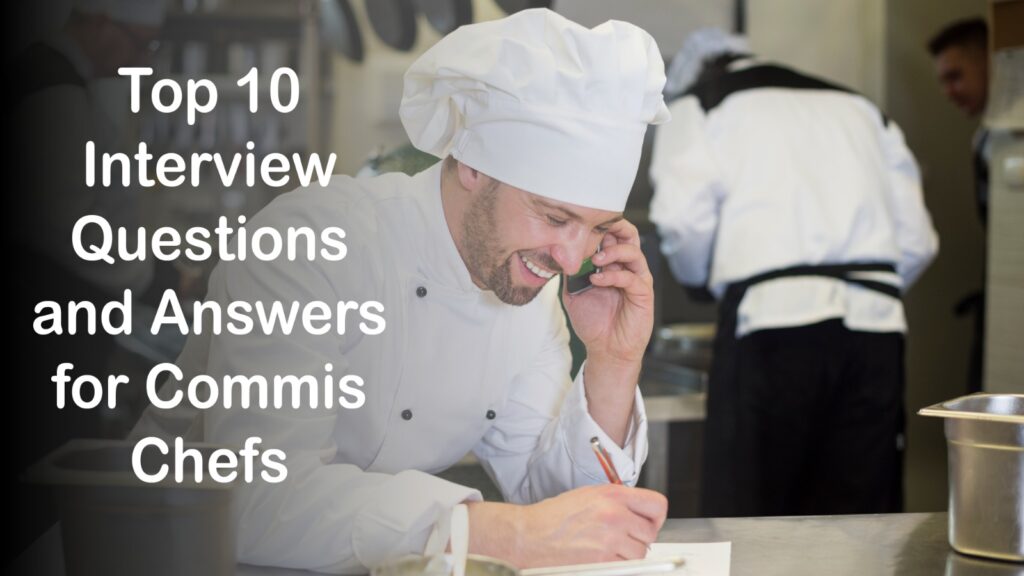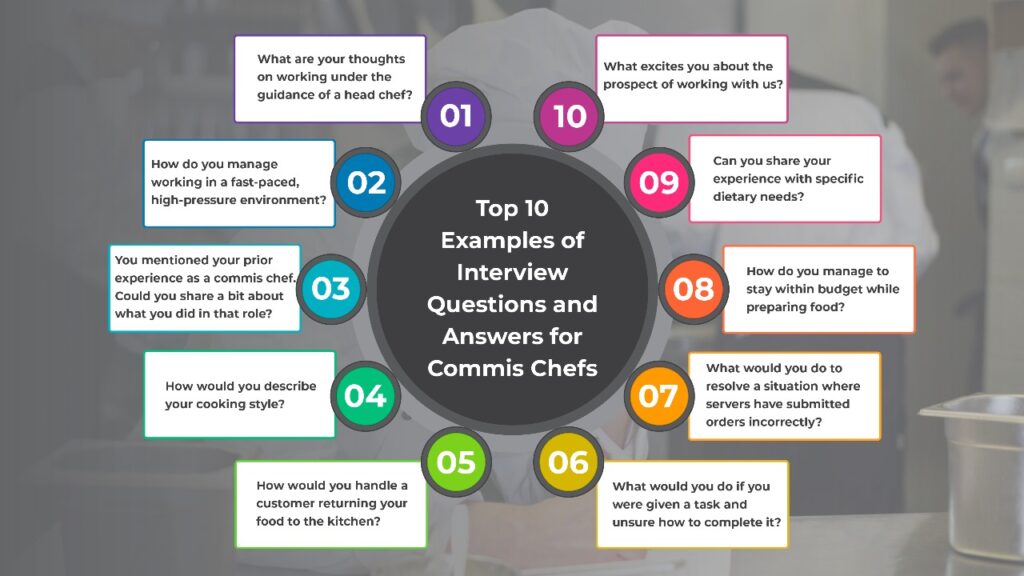
Top 10 Interview Questions and Answers for Commis Chefs
Commis chefs play essential roles in many hotels, restaurants, and other departments (like airport lounges) equipped with commercial kitchens. Their primary responsibilities include ingredient preparation, measuring the ingredients for chef de parties, receiving receipt of deliveries, and maintaining a clean and streamlined environment in the kitchen. Typically, A commis chef holds the most junior position in a professional kitchen, assisting the head chef in food preparation, maintaining kitchen cleanliness, and managing supplies. As you seek a commis chef job, it’s essential to brace yourself for the job interview process.
To assist you in making a great “first impression,” we’ve researched and found the top 10 interview questions often asked of commis chefs during interviews with sample answers.
EXPLORE JOBS ON KHAANSAMA
Top 10 Examples of Interview Questions and Answers for Commis Chefs

Q-1: What are your thoughts on working under the guidance of a head chef?
Why is this question important? A simple yet important question. It offers valuable insight into your personality and reveals your ability to follow instructions and work well under supervision. Furthermore, your answer reflects your motivation to learn and showcases your capacity to complete tasks without causing any disruptions.
Ans: As someone who is new to this experience, I am genuinely excited about the prospect of being supervised by a skilled head chef. A good leader can present me with a valuable opportunity to learn from an experienced professional and refine my work and leadership potential. Overall, I look forward to the challenges and growth opportunities that lie ahead.
Collaborating with my team is something I’m looking forward to. I want to be an integral part of plan on creating a workflow that’s efficient, to provide our customers with better service.
Q-2: How do you manage working in a fast-paced, high-pressure environment?
Why is this question important? This question prompts candidates to give away their approach to handling tasks in a hasty kitchen environment, where no one will be on the head of the Commis Chef to guide them (during rush hour or any festival). For Commis Chefs, maintaining composure amid pressure is crucial to ensuring seamless service for patrons and ensuring they do what they are supposed to do without intervening or disturbing the flow.
Ans: With previous experience in fast-paced kitchens, I’ve learned that I excel under pressure. Instead of panicking, I remain calm and focused on my responsibilities. Even during busy shifts, I find fulfillment in ensuring smooth operations. When unexpected challenges arise, I use the pressure to spark my creativity and quick thinking, enabling me to swiftly address any issues that come up. My main goal is to maintain workflow and concentrate on completing tasks effectively.
Q-3: You mentioned your prior experience as a commis chef. Could you share a bit about what you did in that role?
Why is this question important? Almost all the interviewers direct this question to understand your past work experience, true skills, behavior towards previous employers, and much more. The main motive is to get a better understanding of your nature.
Ans: I have nearly a year of experience as a commis chef, where I gained valuable insights into food preparation. Some of my responsibilities included:
● Preparing various ingredients like cheeses, meats, vegetables and fruits
● Cutting and dicing the items for dishes, according to specific requirements
● Making starters like soups, salads, and sandwiches
● Managing tasks related to portioning, plating, and garnishing
● Ensuring proper disposal of all the kitchen waste
● Monitoring and maintaining food inventory levels
● Organizing the rotation of food items in storage for freshness
In addition, I occasionally worked overtime whenever the workload required it. This dedication to my job was recognized with the prestigious “Employee of the Month” award on one occasion (feel free to mention any other accomplishments you achieved during your time).
Q-4: How would you describe your cooking style?
Why is this question important? Hiring managers frequently ask about your culinary style and approach to gain insights into your personality and work habits. It’s ideal to describe yourself using a few adjectives that capture the essence of your unique cooking style, such as innovative, traditional, or health-conscious.
Ans: My culinary approach revolves around creativity and innovation. I love experimenting and exploring to create one-of-a-kind dishes that are not only visually stunning but also delightful to the palate. While I enjoy adding a creative twist to traditional recipes, I always make sure to preserve the original flavor profile of the dish.
Alongside taste, presentation holds great importance according to my cooking philosophy. I believe that food should not only taste phenomenal but also be visually appealing.
Q-5: How would you handle a customer returning your food to the kitchen?
Why is this question important? Understanding how potential candidates handle feedback can help the interviewers in determining how you will handle their kitchen.
Ans: I try not to take it personally when food is returned to the kitchen. Ultimately, I want my customers to enjoy their meals, so if something isn’t right, I appreciate them bringing it to my attention. I’ll always collaborate with the kitchen team to prepare a fresh dish swiftly. And I will ensure that there is no lackness from our side.
Q-6: What would you do if you were given a task and unsure how to complete it?
Why is this question important? Inquiring about how one tackles predicaments while working provides interviewees the opportunity to display their handling methods. Referencing past situations and illustrating one’s enthusiasm in obtaining new information would be beneficial.
Ans: Asking questions is an essential aspect of efficient and accurate task completion in any kitchen scenario. Whenever I am given a task that I am unsure about, my immediate approach is to seek clarification.
As a Commis Chef, my first course of action when I need help is to turn to my superiors or colleagues for advice. If they are not available, I then consult online resources or cookbooks for guidance. However, in the rare instance that I cannot find any answers or direction, I am comfortable relying on my own judgment through trial and error, as long as I prioritize safety measures.
Q-7: What would you do to resolve a situation where servers have submitted orders incorrectly?
Why is this question important? Effective communication between waitstaff and kitchen crew is crucial in ensuring smooth operations. The interviewer asks this question to gauge the candidate’s ability to provide constructive feedback to their colleagues, as it reflects their conflict resolution skills in their role.
Ans: In any restaurant, both kitchen staff and waitstaff face their own pressures. However, it’s crucial to acknowledge that waitstaff work in a fast-paced environment where they interact directly with customers, making mistakes more likely. In this situation, I would suggest speaking to the colleague responsible for the order to determine whether the issue resulted from a human error while taking down the order or from misunderstanding the customer’s request.
After identifying the root cause, I would offer my support and share any insights I’ve acquired from previous experiences to prevent similar incidents in the future.
Q-8: How do you manage to stay within budget while preparing food?
Why is this question important? This question is asked by interviewer to understand your time and resource management skill.
Ans: Maintaining budget constraints during food preparation is key to being an effective Commis Chef. I recognize the significance of cost control and ensuring the efficient utilization of ingredients. To achieve this, I always plan my recipes meticulously to ensure I utilize only the necessary ingredients.
Q-9: Can you share your experience with specific dietary needs?
Why is this question important? It helps the interviewer assess candidates’ skill in customizing menu options to meet customer preferences. The ability to adapt while maintaining quality is crucial for ensuring inclusivity for patrons with various dietary requirements.
Ans: While working at a restaurant that had limited options for vegans, I faced difficulties in accommodating guests with lactose intolerance. To solve this issue, I dedicated several weeks to experimenting and came up with three new menu items that were free of dairy, gluten, and animal products. These additions were then proposed to the head chef.
Q-10: What excites you about the prospect of working with us?
Why is this question important? When asked this question as a candidate, it is essential to provide a thoughtful response. This opportunity allows you to highlight why you chose this particular place of employment and enables the interviewer to gain insight into your rationale. Additionally, it is an excellent chance to convey your familiarity with and enthusiasm for the company’s values and products.
Ans: I’m looking forward to experiencing your restaurant’s immersive dining. Your innovative approach to fine dining and dedication to exceptional customer service have really impressed me. I’m excited to improve my skills in providing excellent service and creating delicious culinary experiences for diners.
Conclusion
Now you know what to say during an interview! Alter your answers to perfection, and create a great impression that will surely lock your position in hotel and restaurant. Remember to be calm and be confident while answering.